初中_现在完成时讲解练习及答案
初中_现在完成时讲解练习及答案
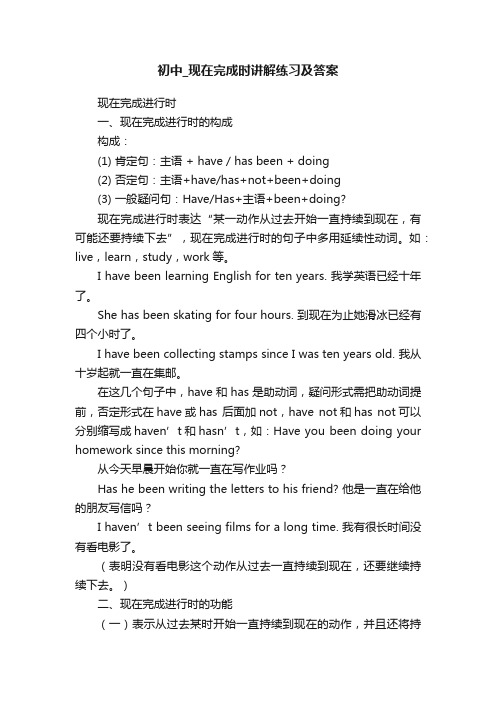
初中_现在完成时讲解练习及答案现在完成进行时一、现在完成进行时的构成构成:(1) 肯定句:主语 + have / has been + doing(2) 否定句:主语+have/has+not+been+doing(3) 一般疑问句:Have/Has+主语+been+doing?现在完成进行时表达“某一动作从过去开始一直持续到现在,有可能还要持续下去”,现在完成进行时的句子中多用延续性动词。
如:live,learn,study,work等。
I have been learning English for ten years. 我学英语已经十年了。
She has been skating for four hours. 到现在为止她滑冰已经有四个小时了。
I have been collecting stamps since I was ten years old. 我从十岁起就一直在集邮。
在这几个句子中,have和has是助动词,疑问形式需把助动词提前,否定形式在have或has 后面加not,have not和has not可以分别缩写成haven’t和hasn’t,如:Have you been doing your homework since this morning?从今天早晨开始你就一直在写作业吗?Has he been writing the letters to his friend? 他是一直在给他的朋友写信吗?I haven’t been seeing films for a long time. 我有很长时间没有看电影了。
(表明没有看电影这个动作从过去一直持续到现在,还要继续持续下去。
)二、现在完成进行时的功能(一)表示从过去某时开始一直持续到现在的动作,并且还将持续下去。
I have been learning English since ten years ago.自从十年前以来我一直在学英语。
初中现在完成时练习题及答案
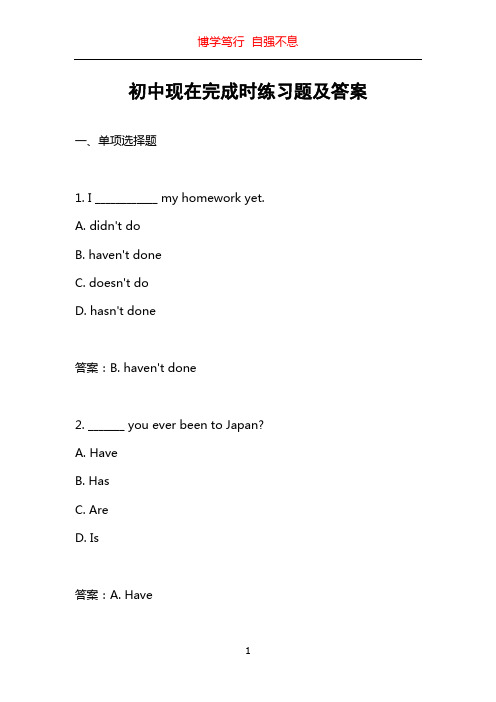
初中现在完成时练习题及答案一、单项选择题1. I ____________ my homework yet.A. didn't doB. haven't doneC. doesn't doD. hasn't done答案:B. haven't done2. _______ you ever been to Japan?A. HaveB. HasC. AreD. Is答案:A. Have3. Sarah _________ books at the library.A. had readB. had been readingC. has readD. has been reading答案:C. has read4. We _________ each other since last week.A. didn't seeB. haven't seenC. haven't been seeingD. doesn't see答案:B. haven't seen5. _______ you ever _______ surfing?A. Did, goB. Have, wentC. Have, goneD. Did, gone答案:C. Have, gone二、完形填空题It has been a different world without our dear friend, Oscar. We __6__ him since we were eight-years-old. Oscar was a great friend and an amazing person. He __7__ us to be much better people.Last summer, Oscar fell terribly ill. He __8__ in the hospital for a few weeks, but unfortunately, he __9__ his battle with the illness and __10__ away.Since Oscar's death, we __11__ daily memories of our time with him. We __12__ how he always had something positive to say, no matter what. Oscar __13__ inspired us to be positive and kind, even in difficult times.We have been __14__ for several therapy sessions as a group, and it has really helped us __15__ with the loss of our friend. We __16__ that accepting the loss is a process, and it takestime to heal. But we are __17__ grateful for the time we had with Oscar and the memories we __18__ with him.Oscar's __19__ and laughter is greatly missed, but his __20__ will forever be in our hearts.6. A. knowB. have knownC. knewD. known答案:B. have known7. A. haveB. hasC. hadD. having答案:C. had8. A. wereB. has beenC. hasD. had been答案:D. had been9. A. losesB. lossC. loosesD. lost答案:D. lost10. A. passB. passedC. passingD. passes答案:B. passed11. A. rememberB. rememberedC. remembersD. have remembered答案:B. remembered12. A. alwaysB. usuallyC. sometimesD. never答案:A. always13. A. yetB. alreadyC. alsoD. always答案:D. always14. A. goB. goesC. goneD. going答案:A. go15. A. copeB. copingC. copedD. have coped 答案:B. coping16. A. knowB. knewC. knownD. knowing答案:C. known17. A. tooB. veryC. soD. really答案:D. really18. A. madeB. makeC. have madeD. making答案:C. have made19. A. joyfulB. happinessC. joyfulD. joy答案:D. joy20. A. friendshipB. friendC. friendsD. friendly答案:C. friends三、阅读理解题Emma has always been interested in photography. For her13th birthday, her parents bought her a camera and she has been taking photos ever since.In the past year, Emma has taken over 10,000 photos. She has traveled to different places and captured the beauty around her. She has photographed stunning landscapes, cute animals, and even her friends and family. Emma has discovered that the more she practices, the better her photos turn out.Emma has also created an online portfolio of her photos. She has received positive feedback from friends and strangers alike. Some people have even contacted her asking if they can purchase prints of her photos.Recently, Emma entered a photography contest. The theme was \。
人教新目标初中英语语法-现在完成时讲解以及练习题(含答案)
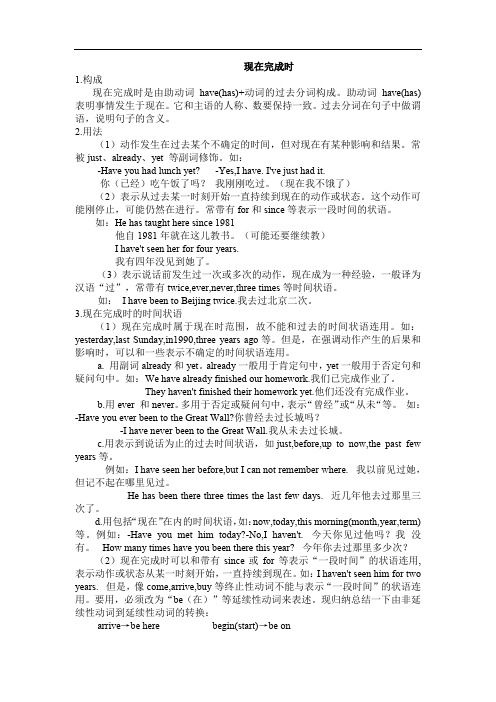
现在完成时1.构成现在完成时是由助动词have(has)+动词的过去分词构成。
助动词have(has)表明事情发生于现在。
它和主语的人称、数要保持一致。
过去分词在句子中做谓语,说明句子的含义。
2.用法(1)动作发生在过去某个不确定的时间,但对现在有某种影响和结果。
常被just、already、yet 等副词修饰。
如:-Have you had lunch yet? -Yes,I have. I've just had it.你(已经)吃午饭了吗?我刚刚吃过。
(现在我不饿了)(2)表示从过去某一时刻开始一直持续到现在的动作或状态。
这个动作可能刚停止,可能仍然在进行。
常带有for和since等表示一段时间的状语。
如:He has taught here since 1981他自1981年就在这儿教书。
(可能还要继续教)I have't seen her for four years.我有四年没见到她了。
(3)表示说话前发生过一次或多次的动作,现在成为一种经验,一般译为汉语“过”,常带有twice,ever,never,three times等时间状语。
如:I have been to Beijing twice.我去过北京二次。
3.现在完成时的时间状语(1)现在完成时属于现在时范围,故不能和过去的时间状语连用。
如:yesterday,last Sunday,in1990,three years ago等。
但是,在强调动作产生的后果和影响时,可以和一些表示不确定的时间状语连用。
a. 用副词already和yet。
already一般用于肯定句中,yet一般用于否定句和疑问句中。
如:We have already finished our homework.我们已完成作业了。
They haven't finished their homework yet.他们还没有完成作业。
b.用ever 和never。
现在完成时讲解与练习题(含答案)
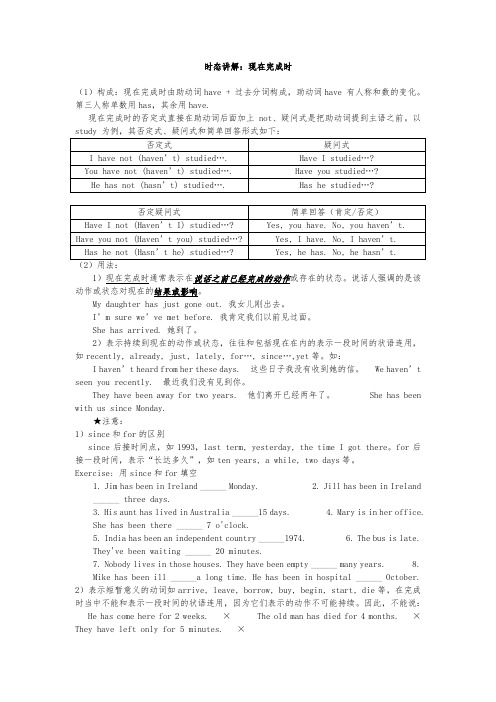
时态讲解:现在完成时(1)构成:现在完成时由助动词have + 过去分词构成,助动词have 有人称和数的变化。
第三人称单数用has,其余用have.现在完成时的否定式直接在助动词后面加上not、疑问式是把助动词提到主语之前。
以study 为例,其否定式、疑问式和简单回答形式如下:(2)用法:1)现在完成时通常表示在说话之前已经完成的动作或存在的状态。
说话人强调的是该动作或状态对现在的结果或影响。
My daughter has just gone out. 我女儿刚出去。
I’m sure we’ve met before. 我肯定我们以前见过面。
She has arrived. 她到了。
2)表示持续到现在的动作或状态,往往和包括现在在内的表示一段时间的状语连用,如recently, already, just, lately, for…,since…,yet等。
如:I haven’t heard from her these days. 这些日子我没有收到她的信。
We haven’t seen you recently. 最近我们没有见到你。
They have been away for two years. 他们离开已经两年了。
She has been with us since Monday.★注意:1)since和for的区别since后接时间点,如1993,last term, yesterday, the time I got there。
for后接一段时间,表示“长达多久”,如ten years, a while, two days等。
Exercise: 用since和for填空1. Jim has been in Ireland ______ Monday.2. Jill has been in Ireland______ three days.3. His aunt has lived in Australia ______15 days.4. Mary is in her office.She has been there ______ 7 o'clock.5. India has been an independent country ______1974.6. The bus is late.They've been waiting ______ 20 minutes.7. Nobody lives in those houses. They have been empty ______ many years. 8.Mike has been ill ______a long time. He has been in hospital ______ October. 2)表示短暂意义的动词如arrive, leave, borrow, buy, begin, start, die等,在完成时当中不能和表示一段时间的状语连用,因为它们表示的动作不可能持续。
【英语】英语现在完成时解题技巧讲解及练习题(含答案)含解析
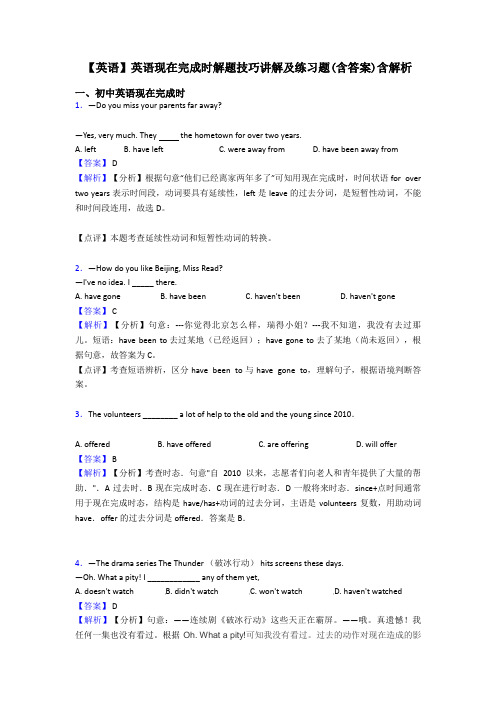
【英语】英语现在完成时解题技巧讲解及练习题(含答案)含解析一、初中英语现在完成时1.—Do you miss your parents far away?—Yes, very much. They the hometown for over two years.A. leftB. have leftC. were away fromD. have been away from【答案】 D【解析】【分析】根据句意“他们已经离家两年多了”可知用现在完成时,时间状语for over two years 表示时间段,动词要具有延续性,left是 leave的过去分词,是短暂性动词,不能和时间段连用,故选D。
【点评】本题考查延续性动词和短暂性动词的转换。
2.—How do you like Beijing, Miss Read?—I've no idea. I _____ there.A. have goneB. have beenC. haven't beenD. haven't gone【答案】 C【解析】【分析】句意:---你觉得北京怎么样,瑞得小姐?---我不知道,我没有去过那儿。
短语:have been to去过某地(已经返回);have gone to去了某地(尚未返回),根据句意,故答案为C。
【点评】考查短语辨析,区分have been to与have gone to,理解句子,根据语境判断答案。
3.The volunteers ________ a lot of help to the old and the young since 2010.A. offeredB. have offeredC. are offeringD. will offer【答案】 B【解析】【分析】考查时态.句意"自2010以来,志愿者们向老人和青年提供了大量的帮助.".A过去时.B现在完成时态.C现在进行时态.D一般将来时态.since+点时间通常用于现在完成时态,结构是have/has+动词的过去分词,主语是volunteers复数,用助动词have.offer的过去分词是offered.答案是B.4.—The drama series The Thunder (破冰行动) hits screens these days.—Oh. What a pity! I ____________ any of them yet,A. doesn't watchB. didn't watchC. won't watchD. haven't watched【答案】 D【解析】【分析】句意:——连续剧《破冰行动》这些天正在霸屏。
初中英语语法之现在完成时讲解练习及答案

初中英语语法之现在完成时讲解练习及答案现在完成时是英语中常用的一种时态,用来描述过去发生的动作对现在产生的影响。
以下是一些现在完成时的讲解练及答案,希望对你的英语研究有所帮助。
一、选择题1. —Have you ever been to Paris?—No, I ___ been there yet.A. haven'tB. didn'tC. wasn'tD. aren't答案:A. haven't2. They ___ a party to celebrate the success.A. have heldB. heldC. will holdD. are holding答案:A. have heldA. worksB. workedC. will workD. has worked答案:D. has worked4. ___ you ___ your homework yet?A. Do, doB. Did, doC. Have, doneD. Are, doing 答案:C. Have, done5. We ___ the movie twice.A. seeB. sawC. have seenD. will see答案:C. have seen二、填空题1. I ___ (not finish) my homework yet.答案:haven't finished2. We ___ (live) in this city since 2015.答案:have lived3. ___ they ever ___ (visit) a zoo?答案:Have, visited4. He ___ (already eat) dinner.答案:has already eaten5. The teacher ___ (not arrive) yet.答案:has not arrived三、改错题将下列句子中的错误处改正,并将正确的答案写在括号内。
现在完成时讲解及练习(已用)
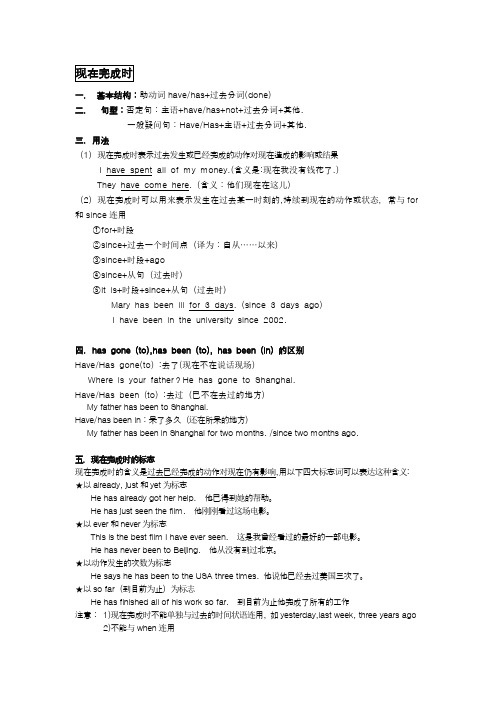
一.基本结构:助动词have/has+过去分词(done)二.句型:否定句:主语+have/has+not+过去分词+其他.一般疑问句:Have/Has+主语+过去分词+其他.三.用法(1)现在完成时表示过去发生或已经完成的动作对现在造成的影响或结果I have spent all of my money.(含义是:现在我没有钱花了.)They have come here. (含义:他们现在在这儿)(2)现在完成时可以用来表示发生在过去某一时刻的,持续到现在的动作或状态,常与for 和since连用①for+时段②since+过去一个时间点(译为:自从……以来)③since+时段+ago④since+从句(过去时)⑤It is+时段+since+从句(过去时)Mary has been ill for 3 days. (since 3 days ago)I have been in the university since 2002.四.has gone (to),has been (to), has been (in) 的区别Have/Has gone(to) :去了(现在不在说话现场)Where is your father?He has gone to Shanghai.Have/Has been (to) :去过(已不在去过的地方)My father has been to Shanghai.Have/has been in:呆了多久(还在所呆的地方)My father has been in Shanghai for two months. /since two months ago.五.现在完成时的标志现在完成时的含义是过去已经完成的动作对现在仍有影响,用以下四大标志词可以表达这种含义: ★以already, just和yet为标志He has already got her help. 他已得到她的帮助。
现在完成时讲解及练习(答案)

现在完成时讲解及练习(答案)初中英语主要时态系列(六)——现在完成时讲解及练习1现在完成时的基本结构肯定句:主语+have/has+动词的过去分词+其他否定句:主语+have/has+not+动词的过去分词+其他⼀般疑问句:Have/Has+主语+动词的过去分词+其他特殊疑问句:特殊疑问词+⼀般疑问句(have/has+主语+过去分词+其他)2现在完成时的⽤法1. 现在完成时⽤来表⽰过去已经完成的动作对现在造成影响或后果。
也就是说,动作或状态发⽣在过去但它的影响现在还存在,强调的是现在。
I have already posted the photo.我已经邮寄出了照⽚。
与此种⽤法连⽤的时间状语时⼀些模糊的过去时间状语,如already(肯定句句中), yet(否定句/疑问句句尾), just, before, recently,still, lately,never 等。
2. 现在完成时也可⽤来表⽰动作或状态发⽣在过去某⼀时刻,持续到现在并且有可能会继续持续下去。
He has lived here since 1978.⾃从1978年以来,他⼀直住在这⼉。
(动作起始于1978年,⼀直住到现在,可能还要继续住下去。
)此种⽤法常与for(+时间段),since(+时间点或过去时的句⼦)连⽤。
谓语动词必须是延续性动词。
有些瞬间动词可变为延续动词:go out----be out finish----be over open----be open die----be dead buy---have fall ill---be ill come back----be back catch a cold----have a cold3现在完成时常见考法对于现在完成时的考查,多以单选、句型转换或词语运⽤的形式考查学⽣在具体语境中灵活运⽤时态的能⼒。
在考试中,会让⼤家判断是否该⽤现在完成时,或者是考查“瞬间动词”不能与表⽰⼀段时间的状语连⽤”这⼀知识点。
- 1、下载文档前请自行甄别文档内容的完整性,平台不提供额外的编辑、内容补充、找答案等附加服务。
- 2、"仅部分预览"的文档,不可在线预览部分如存在完整性等问题,可反馈申请退款(可完整预览的文档不适用该条件!)。
- 3、如文档侵犯您的权益,请联系客服反馈,我们会尽快为您处理(人工客服工作时间:9:00-18:30)。
现在完成进行时一、现在完成进行时的构成构成:(1) 肯定句:主语 + have / has been + doing(2) 否定句:主语+have/has+not+been+doing(3) 一般疑问句:Have/Has+主语+been+doing?现在完成进行时表达“某一动作从过去开始一直持续到现在,有可能还要持续下去”,现在完成进行时的句子中多用延续性动词。
如:live,learn,study,work等。
I have been learning English for ten years. 我学英语已经十年了。
She has been skating for four hours. 到现在为止她滑冰已经有四个小时了。
I have been collecting stamps since I was ten years old. 我从十岁起就一直在集邮。
在这几个句子中,have和has是助动词,疑问形式需把助动词提前,否定形式在have或has 后面加not,have not和has not可以分别缩写成haven’t和hasn’t,如:Have you been doing your homework since this morning?从今天早晨开始你就一直在写作业吗?Has he been writing the letters to his friend? 他是一直在给他的朋友写信吗?I haven’t been seeing films for a long time. 我有很长时间没有看电影了。
(表明没有看电影这个动作从过去一直持续到现在,还要继续持续下去。
)二、现在完成进行时的功能(一)表示从过去某时开始一直持续到现在的动作,并且还将持续下去。
I have been learning English since ten years ago.自从十年前以来我一直在学英语。
(动作还将继续下去)(二)表示在说话时刻之前刚刚结束的动作。
We have been waiting for you for half an hour.我们已经等你半个钟头了。
(动作不再继续下去)(三)表示一个从过去开始延续到现在,可以包括现在在内的一个阶段内,重复发生的行动。
She has been playing tennis since she was eight.注意:(一)表示状态的动词不能用于现在完成进行时。
I have known him for years.我认识他已经好几年了。
(二)有些现在完成进行时的句子等同于现在完成时的句子。
I have been working here for five years.I have worked here for five years.我在这里已经工作两年了。
(三)大多数现在完成进行时的句子不等同于现在完成时的句子。
I have been writing a book.(动作还将继续下去)我一直在写一本书。
I have written a book.(动作已经完成)我已经写了一本书。
三.标志词:以already, just和yet为标志already, just和yet 表示到现在为止动作或状态已经、刚刚或还没有发生。
以ever和never为标志ever和never 表示到现在为止动作或状态曾经或从来没有发生过。
以动作发生的次数为标志若某一动作到现在为止已经发生了若干次,则要使用现在完成时。
以so far为标志so far往往表示到目前为止动作或状态已经发生。
四现在完成进行时与现在完成时的区别:(1) 现在完成时强调动作的完成,而现在完成进行时侧重的是动作的持续进行。
如:I have read a book about birds. (已经读完)I have been reading a book about birds.(一直都在读,现在还在读,有可能会继续读下去。
)(2) 两种时态都有延续性,但现在完成时往往只说明一个事实,一种影响或结果,无感情色彩;现在完成进行时表示一个动作的延续、重复,有时有一定的感情色彩。
如:She has been singing all the day. 她都唱了一整天了。
(抱怨、厌烦)其他(一)现在完成时分“已完成”和“未完成”两种用法:1.“已完成”指的是动作发生在过去,强调其对现在产生的影响。
I have seen this film.我看过这部电影。
(意思说我已经知道了电影的内容。
)注意:“已完成”这种用法一般不带时间状语,但可以和already, yet,before,ever,just,no等副词连用。
I have never said he is rich. 我从来不说他有钱。
2. “未完成”指的是动作从过去开始,且一直继续到现在。
因此不能用表示瞬间性的或称短暂性的动词。
“未完成”的现在完成时常与since结构或“for+一段时间”的状语连用。
I have lived here since I was born.我一出生就住在这里。
注意:“未完成”这种用法还常与until now, so far, in/during the past/ last...等连用。
In the past ten years, many new schools have been built up in our city.过去十年中我市已兴建了许多新学校。
(二)现在完成进行时与现在完成时的“未完成”用法类似。
它强调动作的延续,常常译做“一直在……”。
其基本用法有三个:1. 现在完成进行时表示从过去开始、现在仍在继续的动作。
其时间状语除了since结构和for 结构外,还有all this time, this week, this month, all night, all the morning, recently等状语。
I’ve been waiting for an hour and he still hasn’t turned up.我等了一个小时,可他还没来。
2. 现在完成进行时还用来表示从过去开始、现在刚刚结束的动作。
I’m sorry I’m late. Have you been waiting long?真对不起,我迟到了。
你等了很久了吧?3. 现在完成进行时还可以用来表示反复的、连续的动作。
She has been telephoning her husband, but there is no answer.她一直在给她丈夫打电话,但没有人接。
4. 现在完成时强调动作行为的结果、影响,而现在完成进行时只强调动作行为本身。
Tom’s hands are very dirty. He has been repairing the car.The car is going again now. Tom has repaired it.四、 since,from和for的区别(1) from是介词,后接名词、动名词,表示事情的开始点,以from短语作状语时,句中的谓语动词可用一般现在、过去和将来时。
如:The movie is on from 8:00 p.m. to 10:00 p.m.. 这个电影在晚上8点到10点上映。
They chatted at the meeting from beginning to end. 他们在会议上自始至终都在聊天(2) since则为介词或从属连接词,其后接名词、动名词或从句,表示从某一特定时间起直至现在或过去某一特定时间为止,依然继续着的事情的开始点,在以此为时间状语的句子中,谓语动词常用完成时。
如:Many things have happened since they came here.自从他们来这儿以后,发生了许多事情。
The teacher said that John had made great progress since last semester.老师说从上个学期以来约翰取得了很大的进步。
(3) for是介词,后接名词,可以用来计算持续的时间,表示事情从开始到结束所持续的时间,谓语动词常用过去时或完成时,for与一般现在时连用,表示时间一直持续到将来。
如: I've known her for five years. 我认识她已经五年了。
.1.Mother ____me a new coat yesterday. I _______ it on. It fits me well.A. had made…have triedB. made…have triedC. has made…triedD. made…tried.2 “He ____to draw horses already”. “When ______ he ?” “ Last year “A. learned...has B. learned...did C. has learned...has D. has learned (i)3.Tom _____up into the tree. Look, he ____ high up there !A. has got…isB. has climbed…wasC. got …wasD. climbed…is.4.____ you _____ the text yet ? Yes, we ____ it two hours ago.A. Did…copy…didB. Have…copied…haveC. Have…copied…didD. Did …copy…had.5. “Why ______ she _______ angry ?” “Because he _____ at her just now .”A. did…get…shoutedB. has…got…shoutedC. did…get…has shoutedD. has…got…has shouted.6. ______you __________ the film before ? Where _____ you ____ it ?A. Have …seen…did…seeB. Did …see…did…watchC. Have…seen…have…seenD. Did …see…have…seen.7.You ____ me waiting for two hours. I ____ for you since five.A. kept…waitedB. have kept…waitedC. kept…have waitedD. have kept…have waited .8.Where ______ John _______ ? To the library. He _________ there for an hour.A. has…been…has goneB. has…gone…has beenC. did…go…wentD. did…be…went.9.______ the baby still _____ ? No, it _______ crying.A. Has…cried…has stoppedB. Is…crying…stoppedC. Did …cry…stoppedD. Is…crying…has stopp ed.10. I _______ the way. I ________ here for quite many years.A. knew...have lived C. knew...live C. know...have lived D. know (iv).11. _____ you ever _____ America ? Yes, I have.A. Have…gone toB. Have…gone inC. Have…been toD. Have …been in.12. My brother ____college for over three years.A. has gone toB. has been toC. has been inD. has been at.13.He ________ the Army by the end of 1989. He ______ in the army since then.A. joined…isB. has joined…has beenC. had joined…isD. had joined …has been.14. By the time I _____ back they ____ up ten satellites.A. came…have sentB. came…had sentC. come…have sentD. had come…sent.15. Jack ____ over five lessons by seven o’clock. Then he ____ a rest.A. went…tookB. went…had takenC. had gone…tookD. had gone…had taken.16. We ____ out by that time that he ____ a spy for a long time.A. had found…had beenB. had found…wasC. found…had beenD. found…was.17. Before the news ____ him, he ____ to know about it.A. reaches…has gotB. reached…had gotC. reached…gotD. had reached…got.18. I _____ him a second letter before I ____ from him.A. wrote…heardB. wrote…had heardC. had written…heardD. have written…hear.19. People ____ that the soldiers _____ fighting.A. say…had stoppedB. said…has stoppedC. say…stoppedD. said…had stopped20. We ____ in a good harvest because we ____ enough rain.A. didn’t get…had hadB. got…had hadC. had got…had hadD. got…hadn’t had.21. They _______ for five hours when they ______ in New York.A. flew…arrivedB. had flown…had arrivedC. flew…had arrivedD. had flown…arrived .22. She ____ that it _____ for two days by that day.A. says…has rainedB. says…had rainedC. said…had rainedD. said…rained.23. John _____ there since the year before, so he _____ them.A. had worked…knewB. had worked…had knownC. worked…knewD. worked…had known .24. He _____ angry because he ____ for a long time.A.had got…had waitedB. got…waitedC. had got…waitedD. got…had waitedB.BDACA ADBDC CDDBC ABCDB DCAD。
